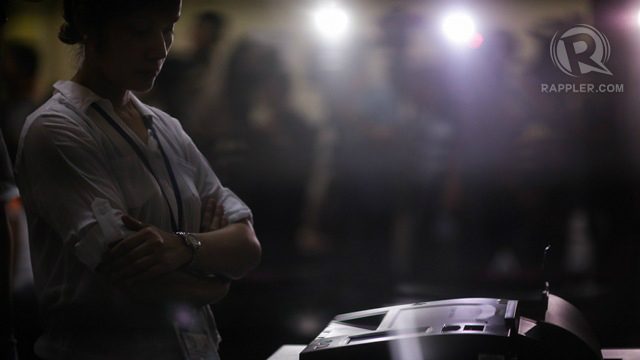SUMMARY
This is AI generated summarization, which may have errors. For context, always refer to the full article.

MANILA, Philippines – It sounds too technical: the Supreme Court (SC) nullified a contract between the Commission on Elections (Comelec) and technology provider Smartmatic for the “diagnostics, maintenance, repair, and replacement” of precinct count optical scan (PCOS) machines.
The SC’s ruling on Tuesday, April 21, however thrusts the Comelec into an unprecedented crisis. (READ: SC nullifies Comelec-Smartmatic contract)
Basically, it means that for now, the Philippines cannot use its 82,000 PCOS vote-counting machines for the presidential elections in 2016.
It also means the country might return to manual voting in election precincts.
Why?
In a phone interview with Rappler on March 26, Comelec spokesman James Jimenez said the poll body will not use PCOS machines “without proper maintenance and repair.”
The SC ruling stops the maintenance and repair of PCOS machines. The High Court agreed with the petitioners that the P268.8-million* ($6.08-million) Comelec-Smartmatic deal should have undergone public bidding.
Therefore, in the current set-up, the Comelec cannot use its 82,000 PCOS machines when Filipinos elect their next leaders in 2016.
Hours after the SC released its ruling, Jimenez stressed that the Comelec cannot repair the PCOS machines “under the contract we currently have.”
Still, he pointed that based on SC spokesman Theodore Te’s announcement on Tuesday, “there doesn’t seem to be any prohibition from actually bidding out refurbishment.”
We asked him if the SC ruling means that:
- Theoretically, the Comelec can do the bidding for PCOS diagnostics again, but this might not be doable given the tight schedule.
- If there is no prohibition on bidding out refurbishment, the Comelec can theoretically lease or buy more than 80,000 PCOS or optical mark reader (OMR) machines to replace the ones that the Comelec cannot use.
Jimenez replied in a text message, “Theoretically, it seems (from what little we know about the decision) the answers would be yes and yes.”
Manual polls an alternative
The Comelec said it is also considering manual voting as an alternative. “Manual elections are preferable to no elections,” Jimenez said in our interview on March 26.
Jimenez added that before reaching the “rock bottom” of manual elections, the Comelec is exploring a “wide-ranging” set of options.
One of these is converting the “precinct count optical scan” or PCOS model into a “counting center optical scan” or CCOS model.
Under the PCOS model, a vote-counting machine is placed in every precinct.
Under the CCOS model, “a lot of precincts will share one machine.”
He said another option is “partial automation,” which means employing “a mixed system throughout the country.”
“Right now, the task that really lies before the Comelec is to single out the one best option that will meet the needs of our electorate,” Jimenez said.
The SC ruling poses a crisis because the Philippines is supposed to hold its third automated elections in May 2016. The Comelec has a year left to prepare for this.
The Philippines’ first automated elections in 2010, which elected Philippine President Benigno Aquino III, and the one in 2010 improved the public’s perception of the electoral process.
Former Comelec chairman Sixto Brillantes Jr said reverting to manual voting is a “return to Jurassic Park.” An election lawyer for the past 25 years, Brillantes said the manual counting of votes will allow election lawyers, for one, to find more loopholes and delay the process.
Observers also fear widespread cheating. Ballots, after all, will change hands several times under a manual process.
It doesn’t help that Aquino hasn’t appointed 3 of the Comelec’s supposedly 7 members: two commissioners and most importantly, a chairman to steer a poll body in crisis. – Rappler.com
Add a comment
How does this make you feel?
There are no comments yet. Add your comment to start the conversation.